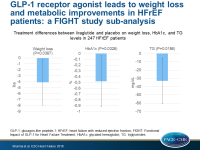GLP-1 receptor agonist leads to weight loss and metabolic improvements in HFrEF patients
In overweight and obese patients with HFrEF, treatment with liraglutide led to significant reductions in body weight, HbA1c, and triglyceride levels compared to placebo.
Liraglutide and weight loss among patients with advanced heart failure and a reduced ejection fraction: insights from the FIGHT trialLiterature - Sharma A, Ambrosy AP, DeVore AD et al. - ESC Heart Failure 2018; published online ahead of print
Introduction and methods
Liraglutide, a glucagon-like peptide-1 (GLP-1) receptor agonist, facilitates weight loss in overweight and obese individuals with hypertension, diabetes, or hyperlipidemia [1,2], but it is not clear whether it also leads to weight loss in patients with heart failure (HF). This posthoc analysis of the Functional Impact of GLP-1 for Heart Failure Treatment (FIGHT) study [3] assessed whether liraglutide is associated with a greater weight reduction compared with placebo, in patients with HF and reduced ejection fraction (HFrEF).
FIGHT was a double-blind, placebo-controlled, randomized clinical trial of HFrEF patients with a HF hospitalization within the previous 14 days and a preadmission prescription of at least 40 mg furosemide daily or an equivalent loop diuretic. Patients with a recent acute coronary syndrome or coronary intervention, or with severe renal, hepatic, or pulmonary disease, as well as those with intolerance to GLP-1 receptor agonist therapy were excluded from the study, leaving a study sample of 300 participants.
Patients were randomized 1:1 to liraglutide titrated up to 1.8 mg/day within the first 30 days or placebo for six months and followed-up in regard to HF stabilization. Compared with placebo, liraglutide had no significant effect on the primary endpoint, which was a global rank score based on three hierarchical tiers, namely time to death, time to rehospitalization for HF and time-averaged proportional change in NT-proBNP level from baseline to 180 days (intention-to-treat analysis). The primary endpoint for the present analysis was the change in body weight from baseline to last completed study visit while on study drug, in patients with at least one study visit (on-treatment analysis). Secondary endpoints included changes in glycated hemoglobin (HbA1c) and triglyceride levels.
Main results
- 247 patients with a median age of 61 years had at least one study visit while on study drug, of whom 123 were receiving liraglutide and 124 were receiving placebo.
- Compared with placebo, liraglutide was associated with a significant weight reduction from baseline to last study visit with a difference of -4.10 lbs between groups (95%CI: -7.94 to -0.25; P=0.0367), which persisted after multiple adjustments. Percentage difference in weight change from baseline between treatments was -2.07% (95%CI: -3.86 to -0.28, P=0.0237).
- The relationship between treatment and weight loss was not modified by BMI (P-interaction=0.57) or the presence of diabetes (P-interaction=0.65).
- There was a significant treatment difference in HbA1c levels between liraglutide and placebo (-0.48%; 95%CI: -0.92 to -0.04; P=0.033), and in triglyceride levels (liraglutide vs. placebo: -33.1 mg/dL; 95%CI: -60.7 to -5.6; P=0.019).
- There was no difference between any serious adverse effect among patients receiving liraglutide vs placebo (P>0.05 for all events).
Conclusion
In overweight and obese HFrEF patients, liraglutide led to significant reductions in body weight, HbA1c, and triglyceride levels, independently of BMI or diabetes, compared to placebo.
References
1. Davies MJ, Bergenstal R, Bode B, et al. Efficacy of liraglutide for weight loss among patients with type 2 diabetes. JAMA 2015; 314: 687–699.
2. Pi-Sunyer X, Astrup A, Fujioka K, et al. A randomized, controlled trial of 3.0 mg of liraglutide in weight management. N Engl J Med 2015; 373: 11–22.
3. Margulies KB, Hernandez AF, Redfield MM, et al. Effects of liraglutide on clinical stability among patients with advanced heart failure and reduced ejection fraction. JAMA 2016; 316: 500–508.

